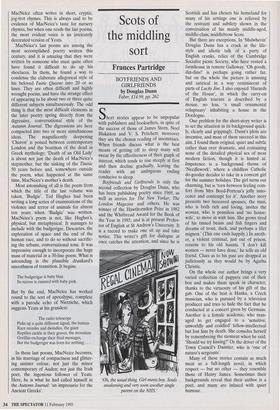Scots of the middling sort
Frances Partridge
BOYFRIENDS AND GIRLFRIENDS by Douglas Dunn Faber, £14.99, pp. 262 Short stories appear to be unpopular with publishers and booksellers, in spite of the success of those of James Stern, Noel Blakiston and V. S. Pritchett; moreover they are the chosen reading of insomniacs. When friends discuss what is the best means of getting off to sleep many will swear by the effectiveness of their graph of interest, which tends to rise steeply at first and then decline gradually, leaving the reader with an ambiguous ending conducive to sleep. Boyfriends and Girlfriends is only the second collection by Douglas Dunn, who has been publishing poetry since 1969, as well as stories for The New Yorker, The London Magazine and others. He was winner of the Hawthornden Prize in 1982 and the Whitbread Award for the Book of the Year in 1985, and is at present Profes- sor of English at St Andrew's University. It is a record to make one sit up and take notice. This writer's gift for dialogue at once catches the attention, and since he is `Oh, the usual thing. Girl meets boy. Souls awakening and very soon another single parent on the NHS.' Scottish and has chosen his homeland for many of his settings one is relieved by the restraint and subtlety shown in the conversation of his mainly middle-aged, middle-class, middlebrow Scots.
But there are exceptions. In 'Mulwhevin' Douglas Dunn has a crack at the life- style and idiotic talk of a party of English cranks, relics of the Cambridge Socialist picnic Society, who have rented a farmhouse in remote Galloway. 'Oh goody, din-dins!' is perhaps going rather far, but on the whole the picture is amusing and satirical in a way reminiscent of parts of Lucky Jim. I also enjoyed 'Hazards of the House', in which the carry-on of English tourists is described by a mouse, no less, 'a small ornamental voluptuary' inhabiting a house in the Dordogne.
One problem for the short-story writer is to set the situation in its background quick- ly, clearly and grippingly. Dunn's plots are inventive, and most of them succeed in this aim. I found them original, quiet and subtle rather than over dramatic, and containing none of the detailed physical sex of most modern fiction, though it is hinted at.
Impotence is a background theme of `Needlework', where a childless Catholic do-gooder decides to take in a convent girl for the summer holidays. The girl turns out charming, but is 'torn between feeling com- fort from Mrs Boyd-Porteus's jolly inno- cence and contempt for it'. Another story presents two bereaved spouses; the man, who is both rich and loving, invites the woman, who is penniless and `no house- wife', to move in with him. She grows tired of his tinned beans and fish fingers and dreams of trout, duck, and perhaps a filet mignon.' (This one ends happily.) In anoth- er, a violent criminal, just out of prison, returns to his old haunts. 'I don't kill women — never have done,' he tells an old friend. Clues as to his past are dropped as judiciously as they would be by Agatha Christie.
On the whole our author brings a very varied collection of puppets out of their box and makes them speak in character, thanks to the virtuosity of his gift of the gab. One of the best is Hanka, a Czech musician, who is pursued by a television producer and tries to hide the fact that he conducted at a concert given by Germans.
Another is a female academic, who man- aged to get engaged to a 'sensitive, unworldly and coddled' fellow-intellectual but lost him by death. She consoles herself by remembering the moment when he said, `Should we try kissing?' Or the driver of the Town Council's Daimler, who is 'one of nature's sergeants'.
Many of these stories contain as much meat as a full-length novel, in which respect — but no other — they resemble those of Henry James. Sometimes their backgrounds reveal that their author is a poet, and many are infused with quiet humour.


























































 Previous page
Previous page